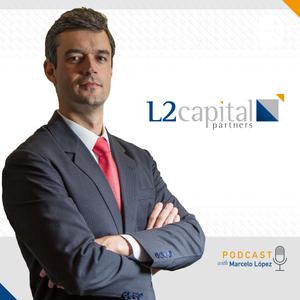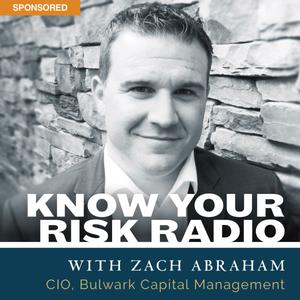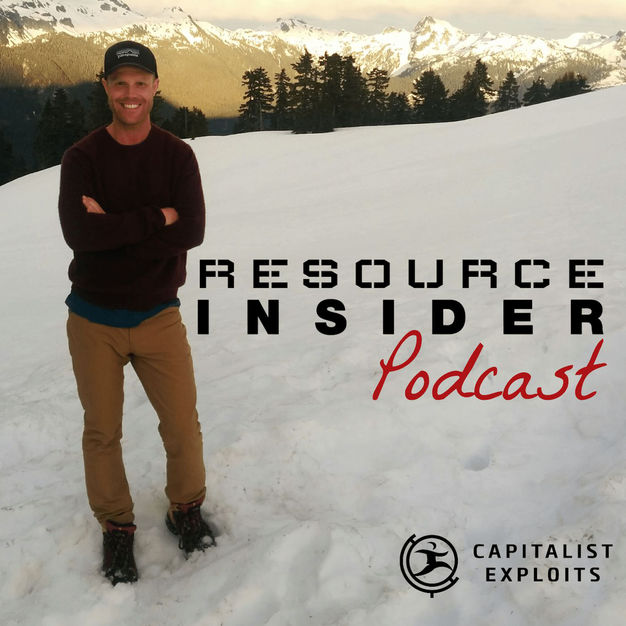
L2 Capital
L2capital
Welcome to the L2 Capital Podcast, focuses on potential opportunities in the market, and brings to you industry leaders and intelligent conversation about their respective areas of expertise.
- 42 minutes 37 secondsPodcast #3: Aaron Edelheit - Cannabis
In this episode, Marcelo Lopez spoke to cannabis investor Aaron Edelheit. Aaron has been doing extensive research in the cannabis sector and has a knack for opportunities, like the purchase of properties after the GFC.
Aaron mentioned the similarities between the cannabis investment now and the property market in 2009. He also talked a lot about interstate commerce, which he views as a hindrance for the sector, and probably the most important thing at the moment.
Besides, Aaron gave his opinion on legislation, schedule review, illegal production and much more.
20 July 2023, 2:00 pm - 44 minutes 9 secondsPodcast #2: Jesse Redmond
In this episode, Marcelo Lopez had a very interesting conversation with Jesse Redmond, Head of Cannabis Research at Water Tower Research. Jesse discussed the current situation of the cannabis market in the USA and the investment perspectives. Redmond also explained the role states play in this universe, the existing political catalysts, including SAFE Banking Act, schedule review, tax-related issues, and what to expect from the Garland memo.
19 July 2023, 1:00 pm - 31 minutes 56 secondsPodcast #1: Jim Grant
In this episode, Marcelo Lopez had a very interesting conversation with Jim Grant, founder and editor of Grant’s Interest Rate Observer. Jim talked about the many risks that are present in the markets today, from private equity to high yield bonds. Besides, Jim gave his views on interest rates and inflation, and its potential impacts in the economy. He also lecture us about his preferred commodity, gold, and talked about nuclear energy and uranium. Last but not least, he left us with 3 excellent book recommendations.
19 July 2023, 2:27 am - 37 minutes 10 secondsPodcast #35: Mark Nelson - Energy and ESG
In today's episode, Marcelo López spoke with Mark Nelson, executive director of the Radiant Energy Fund, a non-profit organization focused on the energy market.
Mark is a nuclear engineer who started his career working with the famous Michael Shellenberger, author of the book “Apocalypse Never” and a great defender of nuclear energy as a source of clean and sustainable energy.
Nelson spoke about ESG investments – these are investments in line with best practices regarding environmental, social and corporate governance aspects. Mark questioned the ESG title that giants in a few sectors, especially technology, claim they hold . Mark explained in detail how energy is a topic of great relevance, but it is not given the proper credit.
Mark also explained the cultural war being waged against nuclear energy and its impacts on the world and told us how to deal with differences of opinion in communication.
When asked how wind and solar power would have supposedly gotten cheaper in recent years, while people who live in regions where there is a lot of availability of these types of energy sources end up paying more for electricity, Mark gave a surprising explanation. He demonstrated that the metric used by the sector is wrong and misleading (LCOE -levelized cost of energy) and gave a fantastic example to substantiate his point.
Mark also spoke about the situation in France, the anti-nuclear youth movement today, its origins and how to deal with the issue. In addition, it addressed an interesting item, the reverse carbon tax.
Nelson also spoke about the German situation and the major problem that nuclear energy will have to face in that country.
Finally, Mark explained, from his point of view, why it is easier to develop nuclear projects and build atomic reactors in Asian countries than in Western countries.
11 December 2020, 5:42 am - 29 minutes 49 secondsPodcast #34: Brandon Munro - Uranium
In today's episode, Marcelo López spoke with Brandon Munro, CEO of Bannerman Resources, a company listed on the Australian stock exchange, ASX, focused on the exploration and development of uranium mines in Namibia.
Brandon, a frequent participant in the L2 Capital podcasts, returned to discuss important topics such as the restart of the Cigar Lake mine, the 20% cut in Kazatomprom's estimated production for 2022, the World Nuclear Association (WNA) Symposium, the latest developments in the spot market, the situation in Iran at the moment and the latest news from Bannerman Resources.
Marcelo had already mentioned in the last podcast recorded with Munro, in early June, that he expected the production of Cigar Lake to return this year and Brandon starts talking about the stock market's response to Cameco's announcement. The reopening procedures of the mine that had been closed due to the pandemic are due to start in September.
Brandon also discusses the decision of Kazatomprom, the world's largest uranium miner, to reduce the estimated production of the metal by 20% in 2022 and the importance of this attitude for the market. Munro talks about the consequences of this and the possible repercussions for the coming years.
He comments on the uranium spot market, the main factors that are affecting the price at the moment and how real investors are reacting.
Brandon explains that the WNA (World Nuclear Association) Symposium will be virtual this year and discusses what the implications will be for nuclear fuel buyers and sellers.
Munro also talks about the Iran sanctions waivers, which end on August 27, and what the United States are doing about it.
Finally, Brandon talks about the changes at Bannerman Resources and how it can affect the company and investors' view of it.
26 August 2020, 9:04 pm - 45 minutes 8 secondsPodcast # 33B: Fernando Ulrich e Tavi Costa – economia e finanças
No episódio de hoje, segunda parte de uma conversa que foi dividida em duas, Marcelo López conversou com Fernando Ulrich, sócio da Liberta Investimentos, e com Otávio Costa, mais conhecido como Tavi, portfolio manager da Crescat Capital.
Marcelo começa falando do atual estado dos mercados e de uma possível bolha que está se formando nas bolsas pelo mundo afora, especialmente após a entrada mais expressiva do varejo. López cita o exemplo da Tesla e compara o patrimônio de Warren Buffett com o de Elon Musk, sugerindo que isso pode ser um indicador.
Fernando menciona alguns exemplos de empresas que estão quebradas e viram suas ações disparar nos últimos meses, como resultado de aplicativos como Robin Hood.
Tavi comenta sobre frases como “fundamentos não importam” e as críticas ao Warren Buffett. Nesse contexto, ele discute sobre a solidez dos fundamentos da economia e, mais especificamente, sobre o mercado de mineração, os setores bancários, imobiliário e de tecnologia.
Fernando faz uma provocação dizendo que o mercado só está subindo por causa do Fed e dos estímulos dos bancos centrais.
Marcelo fala sobre a tese de investimento em urânio e da assimetria favorável ao investidor paciente e compara com a relação risco x retorno no caso dos investimentos em tecnologia.
Tavi complementa os argumentos e conclusões com alguns exemplos e mostra que a dívida das empresas está alta e continua subindo e faz um questionamento com relação ao mercado de urânio e de commodities em geral.
Marcelo explica em mais detalhes o mercado de urânio, salienta aspectos ligados ao crescimento do mercado consumidor (reatores nucleares) e aos cortes de produção das mineradoras. Ele ainda destaca haver um déficit crescente entre oferta e demanda e acredita que o ajuste será feito por meio do preço do metal.
Marcelo também conta sobre a Coca-Cola e o que realmente está mudando nas empresas, e contrasta o aumento do endividamento e das recompras de ações com as receitas e margens dos negócios.
López pergunta sobre a visão dos convidados sobre bolsa, dólar e taxa juros. Tavi chama a atenção para o estresse no câmbio dos mercados emergentes e destaca problemas na economia chinesa que podem repercutir pelo mundo afora.
Fernando discute os impactos da atual taxa de juros no Brasil e da situação fiscal no câmbio, além das consequências da volatilidade na moeda, e defende uma mudança na meta de inflação.
Marcelo traz à discussão o tema bitcoin e Fernando explica o racional por trás da sua tese de investimento, que foca primeiro em reserva de valor e depois em meio de troca. Tavi também dá sua opinião sobre a moeda digital e sobre uma possível forma de diversificação.
18 July 2020, 6:53 am - 34 minutes 18 secondsPodcast #33 (A): Fernando Ulrich e Tavi Costa
No episódio de hoje, primeira parte de uma conversa que foi dividida em duas, Marcelo López conversou com Fernando Ulrich, sócio da Liberta Investimentos, e com Otávio Costa, mais conhecido como Tavi, portfolio manager da Crescat Capital.
Tavi começa discutindo sobre os 3 itens que ele e a Crescat estavam acompanhando desde o ano passado: a situação na China, os metais preciosos e a bolha nos mercados internacionais. Ele fala sobre sua expectativa em torno dos estímulos monetários e discorre sobre o impacto disso nos metais preciosos.
Fernando completa o raciocínio com sua visão mais macro e questiona sobre a conversibilidade do dólar de Hong Kong e os impactos na economia local. Tavi fala sobre os hedges que a Crescat Capital está usando no momento e suas expectativas sobre o futuro da economia chinesa.
Ulrich então traz suas expectativas com relação a tão sonhada recuperação em “V” das economias mundiais e compara com o pensamento corrente. Ele fala sobre o business cycle, indicadores antecedentes e sobre a rápida queda e retorno dos mercados internacionais.
Marcelo expõe sua visão de que essa é uma crise de solvência, não de liquidez, e que a impressão de dinheiro desenfreada não vai resolver o problema. Tavi completa com sua opinião sobre a atual crise e destaca alguns setores estão sendo prejudicados mais do que outros, além de comparar o setor de tecnologia com o setor de bancos.
Fernando diz que ainda tem muita coisa para acontecer em termos de “saneamento financeiro” e elabora sobre o tema, citando exemplos como o da Boeing. Além disso, ele levanta o questionamento sobre inflação e deflação.
Marcelo conta sobre o respeito que tem pelo mercado de bonds e diz que ainda não está claro o caminho que o mundo vai seguir, ou seja, se haverá inflação ou deflação. Nesse confronto, ele traz bons argumentos para ambos. Do lado da inflação, há a impressão de dinheiro absurda, do lado da deflação, existe o icônico caso Japão, que vem imprimindo dinheiro há décadas, sem que a inflação incomodasse.
15 July 2020, 12:14 am - 33 minutes 20 secondsPodcast #32: Brandon Munro - Uranium
In today's episode, Marcelo López spoke to Brandon Munro, CEO of Bannerman Resources, a company listed on the Australian stock exchange, ASX, focused on the exploration and development of uranium mines in Namibia. Brandon, who has participated in L2 Capital's Podcasts # 05, # 14 and # 18, returned to discuss the Russian Suspension Agreement (RSA), the Iran waivers and the outcome of the Nuclear Fuel Working Group (NFWG).
Munro starts by explaining what the Russian Suspension Agreement (RSA) is in a very clear and objective way. Then, when asked about a potential disruption in the supply of nuclear fuel to the US due to this suspension as early as 2021, Brandon explains what can be done to mitigate this situation.
He also discusses the Corfu Declaration, an agreement similar to the RSA, but in Europe, and its practical effects. Through this Declaration, Russia would be unable to supply more than 20% of Europe’s enriched uranium demand.
Brandon explains how global regulation and control of uranium is carried out in the context of the global nuclear fuel supply chain, as uranium can be mined in Australia, converted and enriched in Russia, produced as a fuel in Sweden and be used in an American reactor.
Brandon comments on the situation in Iran, the agreement signed by President Obama, the US discontentment and subsequent withdrawal from that agreement, on the waivers granted to some companies, the recent withdrawal of three of these waivers and the consequences this could have.
Munro also talks about the release of the Nuclear Fuel Working Group (NFWG) report at the end of April, its main points, the consequences for the global nuclear industry and, specifically, for the USA.
Finally, Brandon and Marcelo discuss Cigar Lake, the Cameco mine whose production was suspended this year, the movement in Port Hope and the difficulties that traders are facing to find uranium in the midst of this bull market.
10 June 2020, 5:21 am - 33 minutes 27 secondsPodcast #31: Rodrigo Constantino - economia e política no Brasil
No episódio de hoje, Marcelo López conversou com Rodrigo Constantino, chairman do Instituto Liberal, autor de vários livros famosos e comentarista no programa 3 em 1 na Jovem Pan.
Rodrigo começa falando sobre os efeitos econômicos do isolamento e distanciamento social causados pela pandemia do coronavírus no mundo.
Em seguida, ele que já trabalhou com o atual ministro da economia Paulo Guedes, nos conta sobre o backgroundintelectual do ministro e comenta sobre os efeitos da pandemia no Brasil e da enorme oportunidade que o país tem no momento de fazer o dever de casa e se sair bem.
Constantino expõe sua visão sobre a situação econômica do país e sobre a relação entre Paulo Guedes e Bolsonaro. Nesse contexto, ele avalia as possibilidades de haver um desmantelamento de parte da equipe econômica do governo, tendo em vista fatores como a situação histórica do Brasil, a política do Centrão e o corporativismo brasileiro.
Em referência a um episódio recente, Rodrigo explica a situação da saída do ex-ministro Moro do governo, suas razões (ou falta delas) e implicações políticas para ele e o presidente.
Constantino traz sua opinião sobre a atual situação chinesa com relação a Hong Kong e Taiwan, e como o mundo está lidando com isso. O sistema vigorante até pouco tempo era o de 1 país, 2 sistemas, e a democracia sempre foi um ponto importante em Hong Kong.
Como economista, Rodrigo discute sobre a recente desvalorização da moeda brasileira, o real, e suas consequências disso para o país.
Rodrigo, como libertário que é, dá sua opinião sobre o bitcoin, a principal criptomoeda do mundo. Aliás, esse foi um ponto interessante e controverso da discussão.
Por fim, Constantino comenta sobre um de seus livros, intitulado “Brasileiro é otário?”, explicando por que o tão famoso jeitinho brasileiro é, na verdade, uma draga para o desenvolvimento do país.
5 June 2020, 7:30 pm - 34 minutes 5 secondsPodcast #30: Adam Rozencwajg - commodities
In today's episode, Marcelo López talked to Adam Rozencwajg, managing partner at Goehring & Rozencwajg, a company specialized in natural resource investments, such as mining, energy and agriculture.
Adam explains the model developed by G&R to understand the dynamic of the shale oil production in the United States and the conclusions drawn regarding the level of productivity and quality of each oil well.
Rozencwajg talks about the price war between Russia and Saudi Arabia and the impact that the clash has had on the oil market. He mentions the strengths and weaknesses that each side has in this dispute, such as, for example, the ability to deal with low prices, oil price needed to balance the budget and the influence of the currency on the costs and profitability of oil companies.
Adam comments on the impact that the COVID-19 pandemic is having on world oil demand and stocks so far and his expectations going forward.
In the face of low oil prices, Rozencwajg discusses the ability of U.S. shale producers to continue to pump oil after price normalization and highlights the role and importance that shale has in meeting global energy demands.
Adam explains the behaviour of prices in the oil futures market, which is currently in contango, and the possibility of returning to backwardation.
Rozencwajg comments on the discrepancies he has found and as well as the upcoming potential opportunities in the oil and gas companies, then finally, on what is important to take into account when analyzing the sector now.
As for the gold-oil ratio, which represents the ratio between the price of gold and the price of a barrel of oil, Adam acknowledges that it is at a very high level and gives his interpretation to the number and how it can be an indicator for positioning in shares of the energy sector in relation to the shares of producers of the precious metal.
Another index, the gold-silver ratio, (which is the ratio between the price of gold and that of silver), also at multi-year high levels, is discussed with Adam, who believes one has to have exposure to precious metals and the shares of companies that produce them.
Finally, Rozencwajg talks about uranium, the fundamentals of the sector and his expectations for the price of the commodity.
27 March 2020, 2:52 am - 27 minutes 3 secondsPodcast #29: Shawn Hackett - soft commodities
In today's episode, Marcelo López spoke to Shawn Hackett, president of Hackett Financial Advisors, a company that specializes in providing advice for farmers and hedgers about soft commodities, based on analysis and forecasts of climate cycles. Hackett Financial Advisors helps traders and producers make decisions in agricultural commodities in order to better conduct their business.
Shawn initially discusses global warming and climate change, issues that have been around for some years. He argues for the non-anthropogenic factors that historically influence the planet's climate, in contrast to the view that the human factor is paramount. Hackett explains how solar cycles work, how long each cycle is, the impact that changes in the sun bring to Earth, what sunspots are, what they represent in terms of physical phenomena and how solar winds affect our planet.
Shawn comments on the importance of understanding and monitoring solar cycles for agricultural commodities and how reliable these cycles are. From an historical perspective, he links these cycles to geopolitical and economic events and also to food production abundance and scarcity.
Hackett explains that the sun rotates around the centre of mass of the solar system and not around itself, as one might think. He then correlates this characteristic with the influence that solar activity has on the planet Earth under given circumstances.
According to him, other variables are also important to understand the climate and the changes to which it is subject. He talks about the temperature of the Pacific and Atlantic oceans and their own cycles and how these cycles, associated with solar cycles, impact the climate in the world. Shawn also talks about the El Niño and La Niña phenomena and their relevance to the climate.
Shawn talks about the moment we are in in relation to solar cycles and ocean temperatures, and the effects that they will have on planet Earth. Hackett also talks about the existing technologies to deal with adversities in agricultural production and comments on which commodities producers and traders should seek exposure to at this time.
19 March 2020, 5:04 am - More Episodes? Get the App
Your feedback is valuable to us. Should you encounter any bugs, glitches, lack of functionality or other problems, please email us on [email protected] or join Moon.FM Telegram Group where you can talk directly to the dev team who are happy to answer any queries.
 Know Your Risk Radio with Zach Abraham, Chief Investment Officer, Bulwark Capital Management
Know Your Risk Radio with Zach Abraham, Chief Investment Officer, Bulwark Capital Management
 Resource Insider Podcast
Resource Insider Podcast
 Palisades Gold Radio
Palisades Gold Radio
 Company Interviews
Company Interviews
 SmithWeekly Discussions
SmithWeekly Discussions
 Jelly Donut Podcast
Jelly Donut Podcast